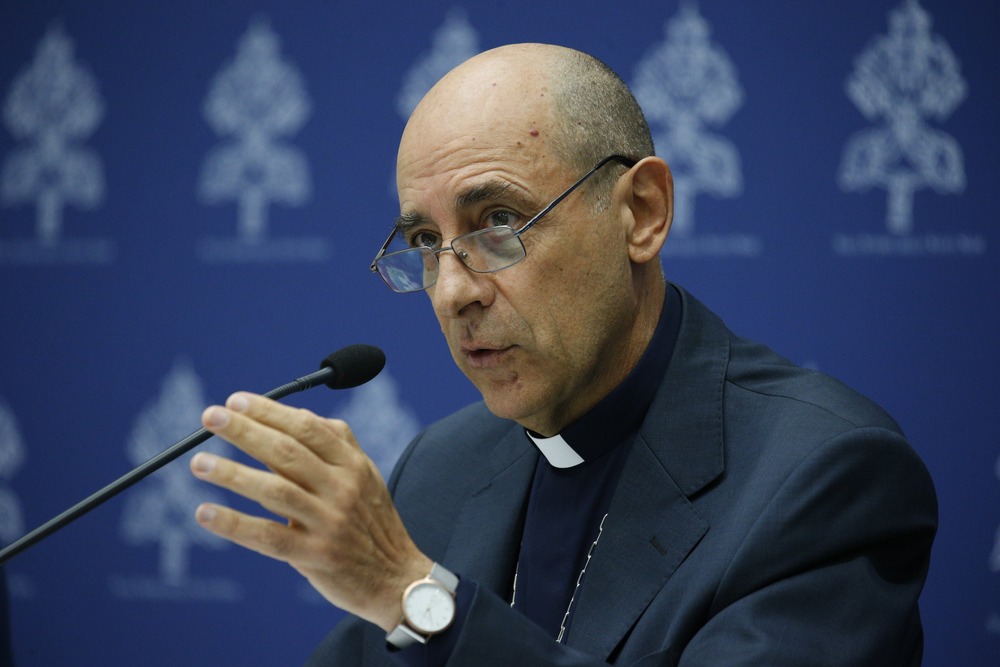
Cardinal Víctor Manuel Fernández, prefect of the Dicastery for the Doctrine of the Faith, speaks at a news conference at the Vatican Sept. 19, 2024, on the dicastery's approval of pilgrimages and other spiritual practices related to the alleged Marian apparitions in Medjugorje, Bosnia-Herzegovina. (CNS/Justin McLellan)
With some prudence, Catholics can benefit spiritually from the messages and spiritual practices associated with the alleged apparitions of Mary in Medjugorje, Bosnia-Herzegovina, said the Vatican Dicastery for the Doctrine of the Faith.
"This does not imply a declaration of the supernatural character of the phenomenon," nor does it mean that the tens of thousands of alleged messages from Mary published by the supposed "seers" are authentic, the dicastery said in a long "Note About the Spiritual Experience Connected with Medjugorje," released Sept. 19.
With the approval of Pope Francis, the dicastery did, however, recognize "the abundant and widespread fruits, which are so beautiful and positive," associated with devotion to Mary, Queen of Peace, and with pilgrimages to Medjugorje.
Cardinal Víctor Manuel Fernández, dicastery prefect, presented the note at a news conference Sept. 19. He said he had not met with the alleged visionaries, but that once the notification was prepared, he wrote to the six of them with some "suggestions" about the future. He provided no further details.
The cardinal also showed reporters the official "nihil obstat" — a declaration of no objection — issued by Bishop Petar Palic of Mostar-Duvno, the diocese where Medjugorje is located, authorizing public devotion there to Mary, Queen of Peace.
While it is possible that a pope could go further and make a declaration about whether the alleged apparitions and messages have a supernatural origin, Fernández said he asked Francis if he wanted to move in that direction and the pope said, "Not at all."
The devotions in Medjugorje began after six young people, aged 10 to 16, said Mary began appearing to them in June 1981. Three of them say they still have apparitions of Mary each day, while the other three have them only on special occasions.
The Vatican's positive judgment of the spiritual experience connected to Medjugorje highlighted: "abundant conversions; a frequent return to the sacraments, particularly, the Eucharist and reconciliation; many vocations to priestly, religious and married life; a deepening of the life of faith; a more intense practice of prayer; many reconciliations between spouses; and the renewal of marriage and family life."
"It should be noted that such experiences occur above all in the context of pilgrimages to the places associated with the original events rather than in meeting with the 'visionaries' to be present for the alleged apparitions," the dicastery added.
The 10,000-word notification looked in-depth at hundreds of the "alleged messages," highlighting the positive, orthodox character of most of them while cautioning that some contain questionable theological affirmations or appear to be more a reflection of the young people's thoughts than what the church would expect from Mary.
Archbishop Aldo Cavalli, the resident apostolic visitor to Medjugorje, is charged with determining whether to allow the publication of alleged messages revealed in the future or alleged messages from the past that have not yet been published, the notification said.
Advertisement
At the news conference, Fernández said the wording of some of the messages is "not exactly from St. Thomas Aquinas." As an example, he pointed to one about the faithful departed being happy when Masses are celebrated for them, a statement which could give the impression that even those in purgatory can be happy.
A key principle in the church's evaluation of phenomena like Medjugorje, the note said, is that "when one recognizes an action of the Holy Spirit in the midst of a spiritual experience, it does not mean that everything belonging to that experience is thereby free from all imprecisions, imperfections, and areas of possible confusion."
Affirming the spiritual value of an alleged apparition or a specific devotion, it said, does not exclude the possibility of "some error of a natural order, not due to bad intentions, but to the subjective perception of the phenomenon."
For example, it said so many of the messages have Mary allegedly insisting people listen to her that they can give the impression that the alleged messages are more important than the Bible.
"This often-repeated appeal probably comes from the love and generous fervor of the alleged visionaries who, with goodwill, feared that the Blessed Mother's calls for conversion and peace would be ignored," the note said. "This insistence becomes even more problematic when the messages refer to requests that are unlikely to be of supernatural origin, such as when Our Lady gives orders about specific dates, places, and practicalities and when she makes decisions about ordinary matters."
In fact, in many of the messages, the dicastery said, Mary "asks that her messages be listened to, but she also subordinates them to the incomparable value of the Word revealed in the Holy Scriptures."
The dicastery drew particular attention to the alleged messages' description of Mary as "Queen of Peace" and how they rightly offer "a vision that is theocentric and very rich in the true meaning of peace. According to this understanding, peace signifies not only the absence of war; it also has a spiritual, family, and social meaning."
"A constant call to abandon a worldly lifestyle and excessive attachment to worldly goods appears in the messages, along with frequent calls for conversion, which makes true peace in the world possible," it said.
Fernández said that with a little "good sense," most Catholics will be able to distinguish between the alleged messages that are spiritually beneficial and those that are imprecise or simply unimportant, like one in which Mary tells the young people her birthday is Aug. 5 and not Sept. 8, as celebrated on the church's calendar.
Asked if he had ever been to Medjugorje, the cardinal said he had during a trip to Europe with two confreres to celebrate the 25th anniversary of their ordinations, which would have meant the trip was in 2011 or 2012. The cardinal said he had not wanted to go — he preferred Venice or Florence — but one of the priests was a "fanatic" and they gave in.
Although the bus journey was not easy, the cardinal said what he found in Medjugorje was "an environment of prayer and peace" and a desire among the pilgrims to change their lives.
"We prayed, and it did us well," he said.






